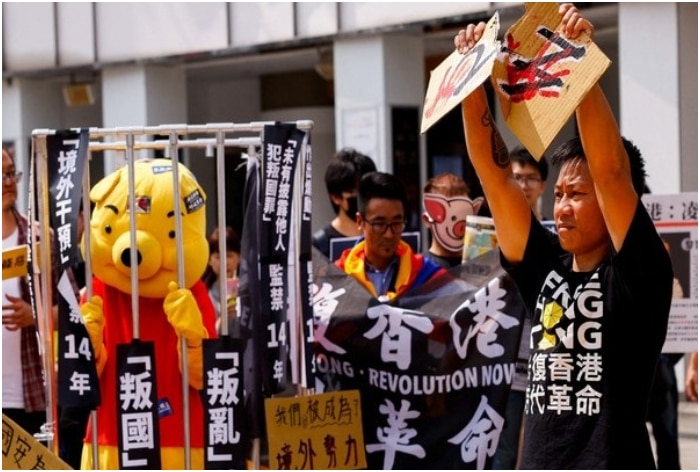A protest was held in Taiwan’s Taipei against the “Article 23” of the new security law that was implemented today in Hong Kong.
Taipei: Several protesters staged a massive protest on Saturday in Taiwan’s Taipei against the “Article 23” of the new security law that was implemented today in Hong Kong. They warned that this law will affect both locals and foreigners, Central News Agency reported. Several people, specially Hong Kongers residing in Taiwan, participated in the protest. Notably, It is worth noting that, “Article 23” in the Basic Law, people convicted of treason, insurrection,, sabotage and could receive life imprisonment. People who found guilty of sedition may get seven to 10 years in prison, an increase from the previous two-year penalty, CNA reported.
Notably, Taipei is one of 20 cities in the globe where demonstrations were held against the new law. “Article 23” of the new security law was approved by the Hong Kong’s Legislative Council on March 19. The law focuses on five types of offenses: treason, insurrection, sabotage, external interference, and theft of state secrets and espionage.
Taiwan-based exile group Hong Kong Outlanders Secretary-General Sky Fung stated that the Hong Kong government previously claimed that the people of Hong Kong did not oppose “Article 23.” However, he added that the reality is that it has become challenging for Hong Kongers to express their opposition after the implementation of the Hong Kong National Security Law.
On June 30, 2020, China imposed the Hong Kong National Security Law (HKNSL) on the territory, establishing the crimes of secession, subversion, terrorism and collusion with foreign forces. In that context, the revised “Article 23” is considered by many to be an extension of the HKNSL. China implemented the HKNSL following months of pro-democracy protests in Hong Kong from mid-2019 to early-2020.
Fung said, “That’s why in Taiwan, in this country with democracy and freedom, we come here to say that [both] Hong Kong people and the Taiwanese are against the Basic Law Article 23,” Central News Agency reported.
One of the organisers of the protest, Fu Tong called “Article 23” as a “draconian law” due to its lack of clear boundaries. He further said, “It’s up to the determination of the Hong Kong government. If they say you’re guilty, then you’re guilty.”
He warned that the legislation poses risks for people of other nations travelling to Hong Kong, adding that if a foreign national visits Hong Kong with a book that slams the government in their luggage, that person would very likely be considered to be inciting sedition, CNA reported.
Taiwanese pro-democracy activist Lee Ming-che, who previously served a five-year prison sentence in China for “subversion of state power,” stated that Taiwan must support actions against “Article 23,” as Taiwan will undoubtedly become next victim if China’s destruction of Hong Kong’s rule of law and abandonment of promises are not stopped.
Lee said, “This isn’t just about Hong Kong. It concerns everyone who loves freedom and democracy around the world, including people from Taiwan,” according to CNA report.
While addressing a press conference on Friday, Democratic Progressive Party (DPP) Legislator Hung Sun-han stressed that the legal scope of “Article 23” for charges such as treason and attempted subversion is broader and more ambiguous in comparison to the HKNSL.
Another DPP lawmaker, Puma Shen stated that “Article 23” has a more serious impact than the HKNSL due to its expanded definition of foreign forces and state secrets, impacting not only the people of Hong Kong, but also the rest of the world, including Taiwan.
Earlier on March 19, Human Rights Watch (HRW) said that the Beijing-controlled Legislative Council in Hong Kong passed a new security law on March 19 that eliminates the last vestiges of fundamental freedoms in the city.
In a statement, HRW stated, “The Safeguarding National Security Ordinance punishes peaceful speech and civil society activism with heavy prison sentences, expands police powers, and weakens due process rights. Because provisions apply to Hong Kong residents and businesses anywhere in the world, the law can silence dissent both in the city and globally.”
“The legislature took only 11 days to pass the Ordinance unanimously. At the committee stage, the legislature reviewed the 212-page bill in 39 hours, with no amendments proposed. The law will come into effect on March 23,” it added.
According to the HRW statement, the people of Hong Kong have consistently opposed such legislation since 2003, when half a million people held a protest against it. It noted that no genuine public consultation took place during the legislative process.
On March 19, Hong Kong’s legislature unanimously passed a new national law that expands government power to crush dissent, Al Jazeera reported. The Safeguarding National Security Law passed includes new measures on treason, espionage, external interference, state secrets and sedition.
“Today is a historic moment for Hong Kong,” said Hong Kong Chief Executive John Lee, who added that the law punishing five major crimes would go into effect on March 23. It gives government more power to quash dissent, widely seen as the latest step in a sweeping political crackdown triggered by pro-democracy protests in 2019.
It comes on top of a similar law imposed by Beijing four years ago, which has already largely silenced opposition voices in the financial hub, Al Jazeera reported. The 90-seat council stacked with pro-China loyalists was first presented with the bill on March 8, following a monthlong public consultation, with Hong Kong’s leader calling for it to be enacted at “full speed”.
As many as 88 lawmakers and the legislative council president voted unanimously to enact the legislation, CNN reported. The law introduces 39 new national security crimes, adding to an already powerful national security law that was directly imposed by Beijing on Hong Kong in 2020 after huge and sometimes violent democracy protests the year before.

